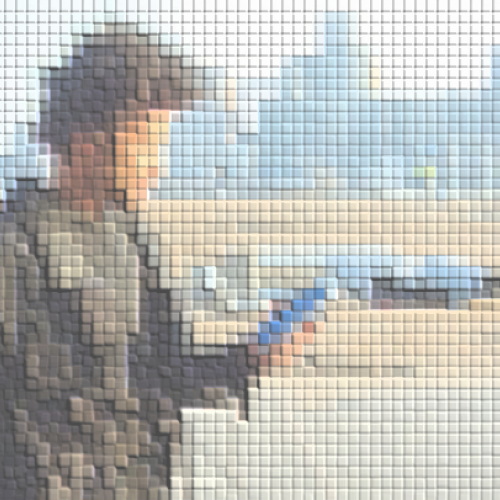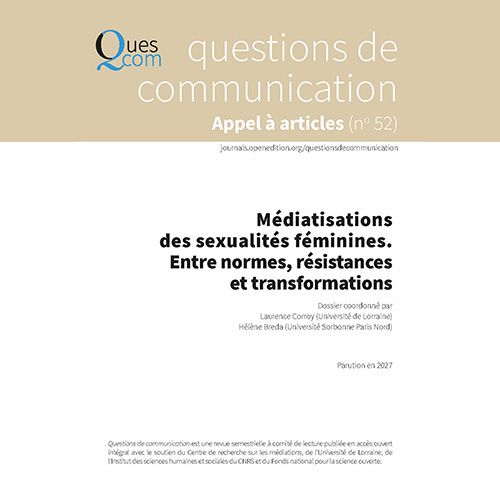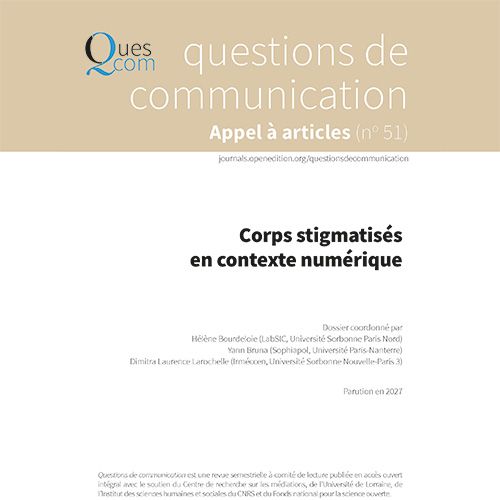[English] Live Performance and Video Games

Call for extended abstracts
Appropriations, Inspirations and Mutual Transfers
5, 6 and 7th of October 2022
International Online Symposium
Organized by
Réjane Dreifuss (Zürcher Hochschule der Künste,
ZHDK, Zurich University of the Arts, Switzerland)
Simon Hagemann (Center for Research on Mediation [Crem], Université de Lorraine, France)
Izabella Pluta (Centre d’études théâtrales, CET, Université de Lausanne, Switzerland)
Since the early 2000s, video games have become the economically dominant medium and their cultural importance has been growing ever since. It is, therefore, logical that an increasing number of creators of live performances are interested in video games. The influence of the latter can be viewed both thematically and formally (or scenographically), with various intermedia configurations (Muehlhausen, 2014). The opposite phenomenon can also be observed: video games generally draw on pre-existing media and are sometimes inspired by live performance.
To better understand new performances that are marked by video games, it would appear beneficial for theatrical research to draw upon game studies. Conversely, video games are increasingly observed from the perspective of their performative dimension (Jayemanne, 2019). Narrative strategies, immersion, interaction, identification, multimodality, characters, and the relationship between physical and virtual worlds: the fields of investigation concerning the complex relationship between live performance and video games are numerous and compound (Nicholson and Harpin, 2017). This symposium will bring together specialists in the field and will provide an overview of research into this relationship. These events will also constitute an opportunity to extend certain previously proposed analyses.
While intermedia theatre, in general, is the subject of a considerable amount of research and the various forms of participatory theatre, such as immersive theatre have also been the subject of several publications, the relationship between live performance and video games is still rarely studied and relatively few research papers dedicated to these issues exist (Biggin, 2017, Dreifuss, 2017, Männel, 2018, Büscher, 2018). Indeed, even if the portal nachtkritik.de has established the category, "Game Theater", in its lexicon, where journalist Christian Rakow writes on the topic since 2012, and although several doctoral theses have been completed or are in progress in relation to this theme (Foster, 2017, Dreifuss, ongoing, Männel, ongoing), there is a limited number of articles that relate to this topic. It should be noted that two international colloquia were held at the Zürcher Hochschule der Künste (ZHdK), in 2016, "Gamification: Digitale Ausrahmungen des Theaters" and in 2018 "Ludification im Theater. Neue Utopien des Theatralen", both organized by Dieter Mersch and Réjane Dreifuss.
The aim is to understand how companies such as Machina eX transpose the structures of certain video games to the theatre, how the hybrid and multimodal performances of groups of artists, such as the emblematic Blast Theory, can be understood in the context of gamification in both the physical and virtual space. Several modes of appropriation have now been established: for example, the group, Vortex LLC, takes its inspiration from Body-Tracked Multiplayer Gaming and Yan Duyvendak from gaming protocols, by working with the public in an open space (Virus). Collectives, such as Rimini Protokoll or companies, such as Extraleben, use video games in the stage space. Video games are not only used in the theatre, but also, for example, in Matthieu Epp's storytelling performances or in hybrid forms, which combine the stage space with an immersive installation, such as the emerging group, RGB's Brainwaves project. It is also interesting to consider theatrical practices that play on immersion and induce a phenomenon of proprioception: they are developed by artists collaborating with neuroscientists, notably Éric Joris and CREW, Andrew Dawson and Aaron Reeves.
From an inverted perspective, we will see how video games are influenced by the performing arts and how the notion of performativity can contribute to a better understanding of games (Homan, 2014 and 2017). As a form of narrative representation, video games arguably include a multitude of intermedia references to film or literature. As a form of playful experience, video games also share many common aspects with board games, but also with theatre, in terms of different dimensions of play, participation and stage interaction (Kolesch, Schütz and Nikoleit, 2019). We will examine in more detail to what extent intermedia references to live performances play a role in video games. We will also look at the creation of video games by live performance artists, such as the Austrian collective, Gold Extra.
It is now widely accepted that game studies are a highly interdisciplinary field and that different approaches are needed to understand all their dimensions. Connections between video games and theatre have existed at least since Brenda Laurel's seminal publication, Computers as Theatre, which highlighted analogies between the two forms, particularly in terms of their potential for representation and interaction. Gonzalo Frasca, in his work of the early 2000s, brought video games closer to Augusto Boal's Theatre of the Oppressed, questioning their potential as a space for active and critical participation by players (Frasca, 2001). Subsequently, various articles have sought to establish links between video games and performativity (Ackermann, 2014, Neitzel, 2018, Leichter, 2019, Huuhka, 2020, Levet, 2021).
One of the main questions is to what extent video games go beyond mere representation and can be viewed as a performative act, not only when played in front of an audience at e-sports events or during broadcasts on Twitch, but also at the level of the game itself. In this context, it will be necessary to understand how video games can develop discourses beyond representation ("procedural rhetoric", Bogost, 2008) and how the players who participate, should be considered ("expressive potential", Genvo, 2012). Central to the analyses are often questions relating to the position of gamers and their participation, be it immersion, involvement or incorporation (Calleja, 2011) or even a dual status as a performer and spectator (Neitzel, 2018). These and other questions will be explored during the symposium, to gain a better understanding of contemporary live performance and video games, and their multiple relationships.
Some of the topics to consider include but are not limited to:
- Game Theater;
- Video games on stage;
- Games and performativity;
- Pervasive games and live performance;
- Performativity theory and game theory;
- The gamification of (performance) art;
- Play (on stage and in games):
- Masks and avatars;
- Immersive theaters, immersive games.
Submission
Submission should include an abstract and a short biography. Material should be prepared in English. Submissions should be about one page long and they should be sent to Réjane Dreifuss (rejane.dreifuss@zhdk.ch), Simon Hagemann (simon.hagemann@univ-lorraine.fr) and Izabella Pluta (izabella.pluta@unil.ch) before June 15th, 2022. The symposium will be held in English in online mode.
Confirmed Keynote speakers
PD Dr. Britta Neitzel (Heinrich Heine Universität Düsseldorf) is a research associate at the Institute for Media and Cultural Studies. She is currently preparing the publication of her habilitation thesis Studies on Games. Her latest publication is Filmische Moderne. 60 Fragmente (ed. together with Oliver Fahle, Lisa Gotto, Lars Nowak, Hedwig Wagner, André Wendler and Daniela Wentz) Bielefeld: transcript 2019.
Prof. Michael Sell (Indiana University of Pennsylvania) is a professor of English and faculty member in the Graduate Program in Literature and Criticism. He is interested in playful literature, especially in interdisciplinary approaches to videogames, board games, and tabletop roleplaying games. He is fascinated by how games and players tell stories and communicate and complicate values. His latest book is Systemic Dramaturgy: A Handbook for the Digital Age (Southern Illinois University Press, 2020) with co-author, Michael M. Chemers.
Scientific Committee:
Ágnes Bakk (Moholy-Nagy University of Art and Design, Hungary)
Réjane Dreifuss (ZHDK, Zurich University of the Arts, Switzerland)
Laurent Di Filippo (Crem, Université de Lorraine, France)
Douglas Eacho (Center for Drama, Theatre and Performance Studies, University of Toronto, Canada)
Georges Gagneré (Inrev, Université Paris 8 Vincennes-Saint-Denis, France)
Simon Hagemann (Crem, Université de Lorraine, France)
Marleena Huuhka (Faculty of Information Technology and Communication Sciences, Tampere University, Finland)
David Javet (Gamelab, Université de Lausanne, Switzerland)
Andy Lavender (Guildhall School of Music & Drama, England)
Cédric Plessiet (Inrev, Université Paris 8 Vincennes-Saint-Denis, France)
Izabella Pluta (CET, Université de Lausanne, Switzerland)
Hélène Sellier (The Seed Crew, France)
Host (online)
Institute for the Performing Arts and Film, Zürcher Hochschule der Künste (Switzerland)
In cooperation with
Inrev, Université Paris 8 Vincennes-Saint-Denis (France)
Crem, Université de Lorraine (France)
GameLab UNIL-EPFL, Université de Lausanne, Ecole polytechnique fédérale de Lausanne (Switzerland)
Association Theatre in Progress (Switzerland)
References
Ackermann, Judith. “Digital Games und Hybrid Reality Theatre”. In New Game Plus Perspektiven der Game Studies. Genres-Künste-Diskurse edited by Beil, Benjamin; Freyermuth, Fundolf S.; Gotto, Lisa, 63-88. Bild und Bit. Studien zur digitalen Medienkultur, Bd. 3. Bielefeld: Transcript, 2014.
Biggin, Rose. Immersive theatre and audience experience: Space, Game and Story in the Work of Punchdrunk. Cham: Palgrave Macmillan, 2017.
Bogost, Ian. “The Rhetoric of Video Games”. In The Ecology of Games: Connecting Youth, Games, and Learning. Foundation Series on Digital Media and Learning edited by Katie Salen., John D. et. al., 117-140. Cambridge, MA: The MIT Press, 2008.
Büscher, Barbara. “Gaming-Strategien im Theater: Spiel-Situationen, dokumentiert und notiert. Methodische überlegungen zur (Aufführungs-)Analyse”. In Digitale Spiele. Interdisziplinäre Perspektiven zu Diskursfeldern, Inszenierung und Musik edited by Christof Hust, 193-204. Bielefeld: Transcript, 2018.
Calleja, Gordon. In-Game: From Immersion to Incorporation. Cambridge, MA: MIT Press, 2011.
Dreifuss, Réjane. “Quand le spectateur devient joueur. L’expérience du théâtre-jeu « Toxik » au théâtre Hebbel am Ufer à Berlin”. In Critiques. Regard sur la technologie dans le spectacle vivant. Carnet en ligne de Theatre in Progress, 2017.
Foster, Greg. Towards a Theatre for Gamers: A new paradigm of practice in contemporary live performance as a response to games and interactivity in digital media and performance culture. Thesis, Salford, University of Salford, 2017.
Frasca, Gonzalo. Videogames of the oppressed Videogames as a means for critical thinking and debate. MA. Thesis, Atlanta, Georgia Institute of Technology, 2001.
Genvo, Sébastien. “Comprendre et développer le potentiel expressif”. In Hermès, La Revue, no 62, 2012/1, 127-133. https://doi.org/10.4267/2042/48290
Homan, Daniel, Homan, Sidney. "The Interactive Theater of Video Games: The Gamer as Playwright, Director, and Actor". In: Comparative Drama, Vol. 48, Iss. 1, 2014. http://scholarworks.wmich.edu/compdr/vol48/iss1/11
Homan, Sidney, ed. Playing offstage: the theater as presence or factor in the real world. Lanham: Lexington Books, 2017.
Huuhka Marleena. "Playing is Performing: Video Games as Performance". In Einspielungen. Neue Perspektiven der Medienästhetik edited by Spöhrer M., Waldrich H. Wiesbaden: Springer VS, 2020. https://doi.org/10.1007/978-3-658-30721-9_3
Jayemanne, Darshana. Performativity in Art, Literature and Videogames. Cham: Palgrave Macmillan, 2017.
Kolesch, Doris, Schütz, Theresa, Nikoleit Sophie, eds. Staging Spectators in Immersive Performances: Commit Yourself! Routledge Studies in Affective Societies Book 5, New York: Routledge, 2019.
Leichter, Magdalena. “Zwischen Passivität und Involvierung: Elemente der Performance im Computerspiel am Beispiel von ‚Tacoma‘“. In paidia.de, 25 Jul. 2019.
Levet, Olivia. “Théâtre immersif et jeu vidéo“. In Appareil, 23. https://doi.org/10.4000/appareil.3991
Männel, Juliane. “›Put theater at play‹: Spielanordnungen im Theater Aktuelle Tendenzen und methodische Fragen an Aufführungen als Spiel-Situationen“. In: Digitale Spiele. Interdisziplinäre Perspektiven zu Diskursfeldern, Inszenierung und Musik edited by Hust, Christof, 205-218. Bielefeld: Transcript, 2018.
Muehlhausen, Andrew. Video Game Theater: Designing Interactive Spaces for Real Human Interactions. Master of Fine Arts in Theater and Dance, San Diego, University of California, 2014. http://escholarship.org/uc/item/1bd195kb
Neitzel, Britta. “Videospiele(n) als Aufführung(en) und Aufführungen in Videospielen”. In Digitale Spiele. Interdisziplinäre Perspektiven zu Diskursfeldern, Inszenierung und Musik edited by Hust, Christof, 179-192. Bielefeld: Transcript, 2018.
Nicholson, Helen, Harpin, Anna. Performance und Participation Practices, Audiences, Politics. London: Palgrave Macmillan, 2017.
Rakow, Christian. “Die Ritter der Interaktivität. Computerspiele und Theater – Wie die neue Medienkunst die Bühnenwirklichkeit verändert”. In Nachtkritik, November 2012. https://nachtkritik.de/index.php?option=com_content&view=article&id=745…




